Piano Sheet Music
 "... As far as being a 'player's player', you've only got to go to Nashville or Argentina, and you can forget about it. The world is full of amazing guitar players, and you know it, and I know it ... it's a humbling experience..." Mark Knopfler / Dire Straits
"... As far as being a 'player's player', you've only got to go to Nashville or Argentina, and you can forget about it. The world is full of amazing guitar players, and you know it, and I know it ... it's a humbling experience..." Mark Knopfler / Dire Straits
Paolo Tosti
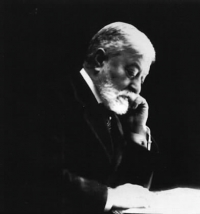
Sir Paolo Tosti (April 9, 1846 – December 2, 1916) was an Italian, later British, composer and music teacher.
Tosti's songs are characterized by natural, singable melodies and sweet sentimentality. He is also known for his editions of Italian folk songs entitled "Canti popoliari Abruzzesi". Tosti is remembered for his light, expressive songs. His style became very popular during the Belle Époque and is often known as salon music. His most famous works are Serenata (lyrics: Cesareo), Goodbye (lyrics: George J. Whyte Mellville) which is sometimes performed in Italian as Addio (lyrics: Rizzelli), and the popular Neapolitan song, Marechiare, the lyrics of which are by the prominent Neapolitan dialect poet, Salvatore Di Giacomo.
As a composer, Tosti is exceptional. Since the beginning of the recording era, numerous recording artists specializing in classical Italian repertoire have recorded Tosti songs, yet Tosti never composed opera. Notable examples on recording include Alessandro Moreschi (the only castrato who ever recorded) singing "Ideale", Nellie Melba singing "Mattinata" and Jussi Björling singing "L'alba separa dalla luce l'ombra".
Tosti's songs are characterized by natural, singable melodies and sweet sentimentality. He is also known for his editions of Italian folk songs entitled "Canti popoliari Abruzzesi". Tosti is remembered for his light, expressive songs. His style became very popular during the Belle Époque and is often known as salon music. His most famous works are Serenata (lyrics: Cesareo), Goodbye (lyrics: George J. Whyte Mellville) which is sometimes performed in Italian as Addio (lyrics: Rizzelli), and the popular Neapolitan song, Marechiare, the lyrics of which are by the prominent Neapolitan dialect poet, Salvatore Di Giacomo.
As a composer, Tosti is exceptional. Since the beginning of the recording era, numerous recording artists specializing in classical Italian repertoire have recorded Tosti songs, yet Tosti never composed opera. Notable examples on recording include Alessandro Moreschi (the only castrato who ever recorded) singing "Ideale", Nellie Melba singing "Mattinata" and Jussi Björling singing "L'alba separa dalla luce l'ombra".
Traditional

Stephane Grappelli
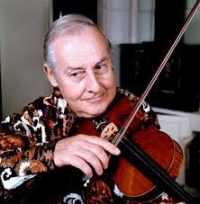
Stéphane Grappelli (French pronunciation: ; 26 January 1908 – 1 December 1997), born Stefano Grappelli, was a French-Italian jazz violinist who founded the Quintette du Hot Club de France with guitarist Django Reinhardt in 1934. It was one of the first all-string jazz bands. He has been called "the grandfather of jazz violinists" and continued playing concerts around the world well into his eighties.
Henry Purcell

Henry Purcell (pronounced /ˈpɜrsəl/; 10 September 1659 (?) – 21 November 1695), was an English organist and Baroque composer of secular and sacred music. Although Purcell incorporated Italian and French stylistic elements into his compositions, his legacy was a uniquely English form of Baroque music.
Dvorak

Antonín Leopold Dvořák (September 8, 1841 – May 1, 1904) was a Czech composer of Romantic music, who employed the idioms and melodies of the folk music of his native Bohemia and Moravia. His works include operas, symphonic, choral and chamber music. His best-known works are his New World Symphony (particularly the slow movement), as well as his Slavonic Dances, American String Quartet, and Cello Concerto in B minor.
Dvořák wrote in a variety of forms: his nine symphonies generally stick to classical models that Beethoven would have recognised, but he also worked in the newly developed symphonic poem form and the influence of Richard Wagner is apparent in some works. Many of his works also show the influence of Czech folk music, both in terms of rhythms and melodic shapes; perhaps the best known examples are the two sets of Slavonic Dances. Dvořák also wrote operas (the best known of which is Rusalka); serenades for string orchestra and wind ensemble; chamber music (including a number of string quartets, and quintets); songs; choral music; and piano music.
Dvořák wrote in a variety of forms: his nine symphonies generally stick to classical models that Beethoven would have recognised, but he also worked in the newly developed symphonic poem form and the influence of Richard Wagner is apparent in some works. Many of his works also show the influence of Czech folk music, both in terms of rhythms and melodic shapes; perhaps the best known examples are the two sets of Slavonic Dances. Dvořák also wrote operas (the best known of which is Rusalka); serenades for string orchestra and wind ensemble; chamber music (including a number of string quartets, and quintets); songs; choral music; and piano music.
Jon English

Jonathon James English (born 26 March 1949 in Hampstead, London, England) is an Australian rock singer, musician, actor and writer. Jon English emigrated to Australia with his parents in 1961. He was an early vocalist and rhythm guitarist for Sebastian Hardie but left to take on the role of Judas Iscariot in the Australian version of the stage musical Jesus Christ Superstar from May 1972, which was broadcast on television. English is also a noted solo singer, his Australian top twenty hit singles include "Turn the Page", "Hollywood Seven", "Words are Not Enough", "Six Ribbons" and "Hot Town".
English was acclaimed for his starring role in the 1978 Australian TV series Against the Wind - he won the TV Week Logie Award for 'Best New Talent in Australia'. He also co-wrote and performed the score with Mario Millo (ex-Sebastian Hardie). The series had international release, known as Mot alla vindar (1980) in Swedish, where both "Six Ribbons" and "Against the Wind" were released as singles, both singles and the soundtrack album peaked at #1 on the Norwegian charts; the first single, "Six Ribbons" and the album, peaked at #4 on the Swedish charts.
During 1983-1985, English won four Mo Awards with three consecutive 'Entertainer of the Year' awards and a further 'Male Vocal Performer' in 1985. English has performed in Gilbert and Sullivan's operettas The Pirates of Penzance, The Mikado and H.M.S. Pinafore from 1984. Performances of Essgee Entertainment's productions of the Gilbert and Sullivan trilogy from 1994 to 1997 were broadcast on Australian TV, they were all released on VHS and subsequently on DVD.
English was acclaimed for his starring role in the 1978 Australian TV series Against the Wind - he won the TV Week Logie Award for 'Best New Talent in Australia'. He also co-wrote and performed the score with Mario Millo (ex-Sebastian Hardie). The series had international release, known as Mot alla vindar (1980) in Swedish, where both "Six Ribbons" and "Against the Wind" were released as singles, both singles and the soundtrack album peaked at #1 on the Norwegian charts; the first single, "Six Ribbons" and the album, peaked at #4 on the Swedish charts.
During 1983-1985, English won four Mo Awards with three consecutive 'Entertainer of the Year' awards and a further 'Male Vocal Performer' in 1985. English has performed in Gilbert and Sullivan's operettas The Pirates of Penzance, The Mikado and H.M.S. Pinafore from 1984. Performances of Essgee Entertainment's productions of the Gilbert and Sullivan trilogy from 1994 to 1997 were broadcast on Australian TV, they were all released on VHS and subsequently on DVD.
Guns and Roses

Guns N' Roses (sometimes abbreviated as GN'R or GnR) is an American rock band. The band formed in Hollywood, Los Angeles, California in 1985. The band, led by frontman and co-founder Axl Rose (born William Bruce Rose), has gone through numerous line-up changes and controversies since its formation; the current lineup comprises vocalist Rose, guitarists Ron "Bumblefoot" Thal, DJ Ashba and Richard Fortus, bassist Tommy Stinson, drummer Frank Ferrer and keyboardists Dizzy Reed and Chris Pitman. The band has released six studio albums, three EPs and one live album during its career.
The band has sold more than 100 million albums worldwide, including over 46 million in the United States. The band's 1987 major label debut album Appetite for Destruction has sold in excess of 28 million copies worldwide and reached number one on the United States Billboard 200. In addition, the album charted three Top 10 hits on the Billboard Hot 100, including "Sweet Child o' Mine" which reached number one. The 1991 albums Use Your Illusion I and Use Your Illusion II debuted on the two highest spots on the Billboard 200 and have sold a combined 14 million copies in the United States alone and 35 million worldwide. After over a decade of work, the band released their follow-up album, Chinese Democracy, in 2008.
Their mid-to-late eighties and early nineties years have been described by individuals in the music industry as the period in which "they brought forth a hedonistic rebelliousness and revived the punk attitude-driven hard rock scene, reminiscent of the early Rolling Stones."
The band has sold more than 100 million albums worldwide, including over 46 million in the United States. The band's 1987 major label debut album Appetite for Destruction has sold in excess of 28 million copies worldwide and reached number one on the United States Billboard 200. In addition, the album charted three Top 10 hits on the Billboard Hot 100, including "Sweet Child o' Mine" which reached number one. The 1991 albums Use Your Illusion I and Use Your Illusion II debuted on the two highest spots on the Billboard 200 and have sold a combined 14 million copies in the United States alone and 35 million worldwide. After over a decade of work, the band released their follow-up album, Chinese Democracy, in 2008.
Their mid-to-late eighties and early nineties years have been described by individuals in the music industry as the period in which "they brought forth a hedonistic rebelliousness and revived the punk attitude-driven hard rock scene, reminiscent of the early Rolling Stones."
Adele

Adele Laurie Blue Adkins (born 5 May 1988 in Enfield, North London), She is the first recipient of the Brit Awards Critics' Choice, which was given to artists who, at the time, had yet to release an album. She debuted at number one with her Mercury Prize nominated debut album 19 in the UK album chart and has since then been certified platinum with sales over 500,000 copies.
Enya
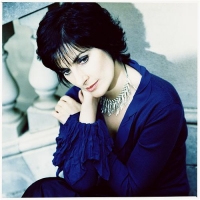
Enya (born Eithne Patricia Nà Bhraonáinon May 17, 1961, Gaoth Dobhair, County Donegal, Ireland), sometimes presented in the media as Enya Brennan, is an Irish singer, instrumentalist and composer. She is Ireland's best-selling solo artist and is officially the country's second biggest musical export (after U2). Her works have earned her four Grammy Awards and an Academy Award nomination, and she is also famous for performing in 10 different languages during her lengthy career. Enya is an approximate transcription of how Eithne is pronounced in her native Irish, in the Donegal dialect.
Jamey Aebersold

Jamey Aebersold (born July 21, 1939 in New Albany, Indiana) is an American jazz saxophonist and music educator. His "Play-A-Long" series of instructional book and CD collections, using the chord-scale system, the first of which was released in 1967, are an internationally renowned resource for jazz education. As of 2009, 126 of these collections have been published by Aebersold, who currently teaches musical improvisation at the University of Louisville. He is also an adept pianist, bassist, and banjoist.
Lady Gaga

Lady Gaga (born Stefani Joanne Angelina Germanotta on March 28, 1986) is an American recording artist. She began performing in the rock music scene of New York City's Lower East Side. She soon signed with Streamline Records, an imprint of Interscope Records, upon its establishment in 2007. During her early time at Interscope, she worked as a songwriter for fellow label artists and captured the attention of Akon, who recognized her vocal abilities, and had her also sign to his own label, Kon Live Distribution.
Her debut album, The Fame, was released on August 19, 2008. In addition to receiving generally positive reviews, it reached number-one in Canada, Austria, Germany, and Ireland and topped the Billboard Top Electronic Albums chart. Its first two singles, "Just Dance" and "Poker Face", co-written and co-produced with RedOne, became international number-one hits, topping the Hot 100 in the United States as well as other countries. The album later earned a total of six Grammy Award nominations and won awards for Best Electronic/Dance Album and Best Dance Recording. In early 2009, after having opened for New Kids on the Block and the Pussycat Dolls, she embarked on her first headlining tour, The Fame Ball Tour. By the fourth quarter of 2009, she released her second studio album The Fame Monster, with the global chart-topping lead single "Bad Romance", as well as having embarked on her second headlining tour of the year, The Monster Ball Tour.
Lady Gaga is inspired by glam rock musicians such as David Bowie and Freddie Mercury, as well as pop music artists such as Madonna and Michael Jackson. She has also stated fashion is a source of inspiration for her songwriting and performances. To date, she has sold over eight million albums and over thirty-five million singles worldwide.
Her debut album, The Fame, was released on August 19, 2008. In addition to receiving generally positive reviews, it reached number-one in Canada, Austria, Germany, and Ireland and topped the Billboard Top Electronic Albums chart. Its first two singles, "Just Dance" and "Poker Face", co-written and co-produced with RedOne, became international number-one hits, topping the Hot 100 in the United States as well as other countries. The album later earned a total of six Grammy Award nominations and won awards for Best Electronic/Dance Album and Best Dance Recording. In early 2009, after having opened for New Kids on the Block and the Pussycat Dolls, she embarked on her first headlining tour, The Fame Ball Tour. By the fourth quarter of 2009, she released her second studio album The Fame Monster, with the global chart-topping lead single "Bad Romance", as well as having embarked on her second headlining tour of the year, The Monster Ball Tour.
Lady Gaga is inspired by glam rock musicians such as David Bowie and Freddie Mercury, as well as pop music artists such as Madonna and Michael Jackson. She has also stated fashion is a source of inspiration for her songwriting and performances. To date, she has sold over eight million albums and over thirty-five million singles worldwide.
Anonymous

Easy piano sheets to teach kids how to play piano.
Paul Simon
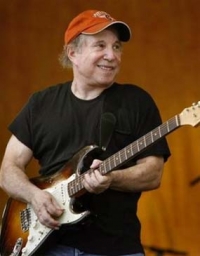
Paul Frederic Simon (born October 13, 1941) is an American songwriter, musician, and member of the Rock and Roll Hall of Fame. In 2006, Time magazine called him one of the 100 "people who shape our world." As of 2007, he resides in New Canaan, Connecticut.
He released Paul Simon in 1972, which contained one of his first experiments with world music, the Jamaican-inspired Mother and Child Reunion, and There Goes Rhymin' Simon in 1973. His 1975 album Still Crazy After All These Years is considered to be among his finest work, particularly the title track and the hit single "50 Ways to Leave Your Lover." The One Trick Pony album, Simon's first album with Warner Bros. Records was also paired with a major motion picture of the same name, with Simon in the starring role. Simon's next album Hearts and Bones, while critically acclaimed, did not yield any hit singles and marked a lull in his commercial popularity in the early 1980s.
In 1985, Simon lent his talents to USA for Africa and performed on the famine relief fundraising single "We Are the World". In 1986 he released the immensely popular Graceland, for which he won a Grammy. The album featured the groundbreaking use of African rhythms and performers such as Ladysmith Black Mambazo. In 1990, he followed up Graceland with the commercially successful and consistent successor album The Rhythm of the Saints, which featured Brazilian musical themes.
His 2000 studio album You're the One, did not reach the commercial heights of previous albums but was considered by many fans and critics to be an artistic success and received a Grammy nomination for Album of the Year. Simon's latest album, Surprise, produced by himself and Brian Eno, was released on May 9, 2006. In commenting on US TV show Ellen what drove him to write material for this latest album, Simon noted the events of September 11, 2001 and also turning 60 since his previous album You're the One.
He released Paul Simon in 1972, which contained one of his first experiments with world music, the Jamaican-inspired Mother and Child Reunion, and There Goes Rhymin' Simon in 1973. His 1975 album Still Crazy After All These Years is considered to be among his finest work, particularly the title track and the hit single "50 Ways to Leave Your Lover." The One Trick Pony album, Simon's first album with Warner Bros. Records was also paired with a major motion picture of the same name, with Simon in the starring role. Simon's next album Hearts and Bones, while critically acclaimed, did not yield any hit singles and marked a lull in his commercial popularity in the early 1980s.
In 1985, Simon lent his talents to USA for Africa and performed on the famine relief fundraising single "We Are the World". In 1986 he released the immensely popular Graceland, for which he won a Grammy. The album featured the groundbreaking use of African rhythms and performers such as Ladysmith Black Mambazo. In 1990, he followed up Graceland with the commercially successful and consistent successor album The Rhythm of the Saints, which featured Brazilian musical themes.
His 2000 studio album You're the One, did not reach the commercial heights of previous albums but was considered by many fans and critics to be an artistic success and received a Grammy nomination for Album of the Year. Simon's latest album, Surprise, produced by himself and Brian Eno, was released on May 9, 2006. In commenting on US TV show Ellen what drove him to write material for this latest album, Simon noted the events of September 11, 2001 and also turning 60 since his previous album You're the One.
Handel

George Frideric Handel (Friday, 23 February 1685 - Saturday, 14 April 1759) was a German-born Baroque composer who is famous for his operas, oratorios and concerti grossi. Born as Georg Friedrich Handel in Halle, he spent most of his adult life in England, becoming a subject of the British crown on 22 January 1727. His most famous works are Messiah, an oratorio set to texts from the King James Bible; Water Music; and Music for the Royal Fireworks. Strongly influenced by the techniques of the great composers of the Italian Baroque and the English composer Henry Purcell, his music was known to many significant composers who came after him, including Haydn, Mozart, and Beethoven.
Handel's compositions include 42 operas; 29 oratorios; more than 120 cantatas, trios and duets; numerous arias; chamber music; a large number of ecumenical pieces; odes and serenatas; and sixteen organ concerti. His most famous work, the Messiah oratorio with its "Hallelujah" chorus, is among the most popular works in choral music and has become a centerpiece of the Christmas season. Also popular are the Opus 3 and 6 Concerti Grossi, as well as "The Cuckoo and the Nightingale", in which birds are heard calling during passages played in different keys representing the vocal ranges of two birds. Also notable are his sixteen keyboard suites, especially The Harmonious Blacksmith.
Handel introduced various previously uncommon musical instruments in his works: the viola d'amore and violetta marina (Orlando), the lute (Ode for St. Cecilia's Day), three trombones (Saul), clarinets or small high cornets (Tamerlano), theorbo, French horn (Water Music), lyrichord, double bassoon, viola da gamba, bell chimes, positive organ, and harp (Giulio Cesare, Alexander's Feast).
Handel's compositions include 42 operas; 29 oratorios; more than 120 cantatas, trios and duets; numerous arias; chamber music; a large number of ecumenical pieces; odes and serenatas; and sixteen organ concerti. His most famous work, the Messiah oratorio with its "Hallelujah" chorus, is among the most popular works in choral music and has become a centerpiece of the Christmas season. Also popular are the Opus 3 and 6 Concerti Grossi, as well as "The Cuckoo and the Nightingale", in which birds are heard calling during passages played in different keys representing the vocal ranges of two birds. Also notable are his sixteen keyboard suites, especially The Harmonious Blacksmith.
Handel introduced various previously uncommon musical instruments in his works: the viola d'amore and violetta marina (Orlando), the lute (Ode for St. Cecilia's Day), three trombones (Saul), clarinets or small high cornets (Tamerlano), theorbo, French horn (Water Music), lyrichord, double bassoon, viola da gamba, bell chimes, positive organ, and harp (Giulio Cesare, Alexander's Feast).
Duke Ellington

Edward Kennedy "Duke" Ellington (April 29, 1899 â May 24, 1974) was an American composer, pianist, and bandleader.
Recognized during his life as one of the most influential figures in jazz, if not in all American music, Ellington's reputation has increased since his death, including a special award citation from the Pulitzer Prize Board.
Ellington called his style and sound "American Music" rather than jazz, and liked to describe those who impressed him as "beyond category", including many of the musicians who served with his orchestra, some of whom were themselves considered among the giants of jazz and remained with Ellington's orchestra for decades. While many were noteworthy in their own right, it was Ellington that melded them into one of the most well-known orchestral units in the history of jazz. He often composed specifically for the style and skills of these individuals, such as "Jeep's Blues" for Johnny Hodges, "Concerto for Cootie" ("Do Nothing Till You Hear from Me") for Cootie Williams and "The Mooche" for Tricky Sam Nanton. He also recorded songs written by his bandsmen, such as Juan Tizol's "Caravan" and "Perdido" which brought the "Spanish Tinge" to big-band jazz. After 1941, he frequently collaborated with composer-arranger Billy Strayhorn, who he called his alter-ego.
One of the twentieth century's best-known African-American celebrities, Ellington recorded for many American record companies, and appeared in several films. Ellington and his orchestra toured the United States and Europe regularly before and after World War II. Ellington led his band from 1923 until his death in 1974. His son Mercer Ellington took over the band until his death from cancer in 1996. Paul Ellington, Mercer's youngest son, took over the Orchestra from there and after his mother's passing took over the Estate of Duke and Mercer Ellington.
Recognized during his life as one of the most influential figures in jazz, if not in all American music, Ellington's reputation has increased since his death, including a special award citation from the Pulitzer Prize Board.
Ellington called his style and sound "American Music" rather than jazz, and liked to describe those who impressed him as "beyond category", including many of the musicians who served with his orchestra, some of whom were themselves considered among the giants of jazz and remained with Ellington's orchestra for decades. While many were noteworthy in their own right, it was Ellington that melded them into one of the most well-known orchestral units in the history of jazz. He often composed specifically for the style and skills of these individuals, such as "Jeep's Blues" for Johnny Hodges, "Concerto for Cootie" ("Do Nothing Till You Hear from Me") for Cootie Williams and "The Mooche" for Tricky Sam Nanton. He also recorded songs written by his bandsmen, such as Juan Tizol's "Caravan" and "Perdido" which brought the "Spanish Tinge" to big-band jazz. After 1941, he frequently collaborated with composer-arranger Billy Strayhorn, who he called his alter-ego.
One of the twentieth century's best-known African-American celebrities, Ellington recorded for many American record companies, and appeared in several films. Ellington and his orchestra toured the United States and Europe regularly before and after World War II. Ellington led his band from 1923 until his death in 1974. His son Mercer Ellington took over the band until his death from cancer in 1996. Paul Ellington, Mercer's youngest son, took over the Orchestra from there and after his mother's passing took over the Estate of Duke and Mercer Ellington.
Christophe Beck
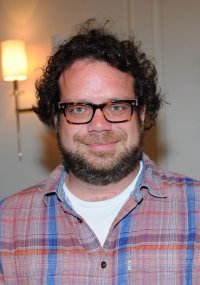
He won an Emmy Award in 1998 for his work on the television series Buffy the Vampire Slayer. He has also worked on Angel and The Practice. His film credits include Starstruck (1998), Let the Devil Wear Black (1999), Bring It On (2000), Confidence (2003), American Wedding (2003), Under the Tuscan Sun (2003), Garfield (2004), Elektra (2005), Garfield: A Tail of Two Kitties (2006), School for Scoundrels, The Pink Panther (2006), We Are Marshall (2006), License to Wed (2007), The Seeker (2007), Fred Claus (2007), Charlie Bartlett (2007), Drillbit Taylor (2008), Phoebe in Wonderland (2008), I Love You, Beth Cooper (2009), The Pink Panther 2 (2009), The Hangover (2009), Waiting for Superman (2010), Percy Jackson & the Olympians: The Lightning Thief (2010), Date Night (2010), Tower Heist (2011), The Muppets (2011), R.I.P.D. (2013), Frozen (2013), Endless Love (2014), Muppets Most Wanted (2014), Ant-Man (2015), The Peanuts Movie (2015), Trolls (2016), Ant-Man and the Wasp (2018), and Frozen II (2019). He appeared in the documentary Finding Kraftland (2006) for his agent Richard Kraft.
Jim Croce
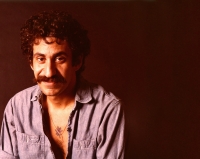
James Joseph Croce (/ˈkroʊtʃi/; January 10, 1943 – September 20, 1973) was an American folk and rock singer-songwriter. Between 1966 and 1973, Croce released five studio albums and numerous singles. During this period, Croce took a series of odd jobs to pay bills while he continued to write, record, and perform concerts. After forming a partnership with songwriter and guitarist Maury Muehleisen his fortunes turned in the early 1970s. His breakthrough came in 1972; his third album You Don't Mess Around with Jim produced three charting singles, including "Time in a Bottle", which reached No. 1 after his death. The follow-up album, Life and Times, contained the song "Bad, Bad Leroy Brown", which was the only No. 1 hit he had during his lifetime.
Yasunori Mitsuda

Yasunori Mitsuda (光田 康典 Mitsuda Yasunori?, born January 21, 1972) is a Japanese video game composer, sound programmer, and musician. He has composed music for or worked on over 35 games, and has contributed to over 15 other albums. He is best known for his compositions for the video games Chrono Trigger, Chrono Cross, Shadow Hearts, Shadow Hearts: Covenant, Xenogears, Xenosaga Episode I, and Mario Party. He began composing video game music for his own games in high school, and after graduation attended Junior College of Music in Tokyo. In 1992 upon graduation he joined Square (now Square Enix) as a composer after seeing a magazine advertisement in an office he was visiting with his professor.
Despite his job title as a composer, Mitsuda worked for two years as a sound engineer. In 1994, after threatening to quit to Square's vice president, Hironobu Sakaguchi, he was assigned to compose the soundtrack to Chrono Trigger. After the game's success and the music's acclaim, he went on to compose several other games for Square, including Xenogears. In 1998 Mitsuda left Square to work as a freelance composer, founding his own music production studio, Procyon Studio, in 2001 as well as his own record label, Sleigh Bells. The company has since expanded to nine employees, and Mitsuda continues to compose for video games, as well as for anime series and his own independent albums.
Despite his job title as a composer, Mitsuda worked for two years as a sound engineer. In 1994, after threatening to quit to Square's vice president, Hironobu Sakaguchi, he was assigned to compose the soundtrack to Chrono Trigger. After the game's success and the music's acclaim, he went on to compose several other games for Square, including Xenogears. In 1998 Mitsuda left Square to work as a freelance composer, founding his own music production studio, Procyon Studio, in 2001 as well as his own record label, Sleigh Bells. The company has since expanded to nine employees, and Mitsuda continues to compose for video games, as well as for anime series and his own independent albums.
Toshio Masuda
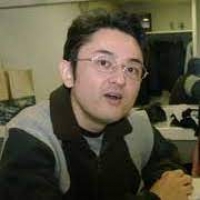
Toshio Masuda (増田 俊郎, Masuda Toshio, born October 28, 1959) is a Japanese composer. He has composed and synthesized scores for several Japanese television shows and animated series.Masuda is perhaps best known as the composer of the 2002 hit anime series Naruto where he combined traditional instruments like the shamisen and shakuhachi together with guitar, drums, bass, piano and other keyboard instruments along with chanting.
Fernando Rochael

Fernando Rochael Musical artist Songs Venha Espírito Santo Medley Natalino Natal Real · 2013 Natal Real Natal Real · 2013
Evert Taube
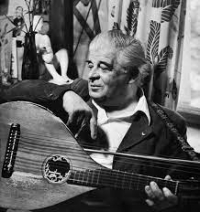
Axel Evert Taube was a Swedish author, artist, composer and singer. He is widely regarded as one of Sweden's most respected musicians and the foremost troubadour of the Swedish ballad tradition in the 20th century.
Michael Jackson

Michael Joseph Jackson (August 29, 1958 – June 25, 2009) was an American singer, dancer and entertainer. Referred to as the King of Pop, he is the most commercially successful entertainer of all time, and one of the most influential. His contributions to music, dance and fashion, along with a much publicized personal life, made him a global figure in popular culture for over four decades.
Alongside his brothers, he made his debut as lead singer and youngest member of The Jackson 5 in 1964. He began his solo career in 1971. His 1982 album Thriller remains the best-selling album ever, with Off the Wall (1979), Bad (1987), Dangerous (1991) and HIStory (1995) also among the world's best-selling albums. He is widely credited with having transformed the music video from a promotional tool into an art form with videos for his songs such as "Billie Jean", "Beat It" and "Thriller" making him the first African American artist to amass a strong crossover following on MTV. With stage performances and music videos, Jackson popularized a number of physically complicated dance techniques, such as the robot and the moonwalk. His distinctive musical sound, vocal style, and choreography, is credited with stretching across and breaking down cultural, racial, economic, generational, and global barriers that has inspired countless pop, rock, R&B and hip hop artists.
One of the few artists to have been inducted into the Rock and Roll Hall of Fame twice, his other achievements feature multiple Guinness World Records—including the "Most Successful Entertainer of All Time"—15 Grammy Awards (including the "Living Legend Award" and the "Lifetime Achievement Award"), 26 American Music Awards (24 only as a solo artist, including one for "Artist of the Century")—more than any artist—, 17 number one singles in the US (including the four as a member of the Jackson 5), and estimated sales of up to 750 million records worldwide making him the world's best selling artist in history.
Jackson's personal relationships and life generated controversy for years. His changing appearance was noticed from the late 1970s onwards, with changes to his nose and to the color of his skin drawing media publicity. He was accused of child sexual abuse in 1993 though no charges were brought, and in 2005 he was tried and acquitted when the jury ruled him not guilty on all charges. He married twice, first in 1994 and again in 1996, and brought up three children, one born to a surrogate mother. While preparing for the This Is It concert tour in 2009, Jackson died at the age of 50 after suffering from cardiac arrest. He reportedly had been administered drugs such as propofol and lorazepam, and his death was ruled a homicide by the Los Angeles County coroner. His death triggered an outpouring of grief from around the world with his globally live broadcast memorial service attracting an audience of up to one billion people; as well as a huge surge in his album sales, resulting in him becoming the best selling artist of 2009 with sales in excess of 8.2 million in the United States where he became the first artist ever to have 4 of the top 20 best-selling albums in a single year, and 29 million albums globally, where he had an unprecedented 8 of the top 25 best-selling albums worldwide.
Alongside his brothers, he made his debut as lead singer and youngest member of The Jackson 5 in 1964. He began his solo career in 1971. His 1982 album Thriller remains the best-selling album ever, with Off the Wall (1979), Bad (1987), Dangerous (1991) and HIStory (1995) also among the world's best-selling albums. He is widely credited with having transformed the music video from a promotional tool into an art form with videos for his songs such as "Billie Jean", "Beat It" and "Thriller" making him the first African American artist to amass a strong crossover following on MTV. With stage performances and music videos, Jackson popularized a number of physically complicated dance techniques, such as the robot and the moonwalk. His distinctive musical sound, vocal style, and choreography, is credited with stretching across and breaking down cultural, racial, economic, generational, and global barriers that has inspired countless pop, rock, R&B and hip hop artists.
One of the few artists to have been inducted into the Rock and Roll Hall of Fame twice, his other achievements feature multiple Guinness World Records—including the "Most Successful Entertainer of All Time"—15 Grammy Awards (including the "Living Legend Award" and the "Lifetime Achievement Award"), 26 American Music Awards (24 only as a solo artist, including one for "Artist of the Century")—more than any artist—, 17 number one singles in the US (including the four as a member of the Jackson 5), and estimated sales of up to 750 million records worldwide making him the world's best selling artist in history.
Jackson's personal relationships and life generated controversy for years. His changing appearance was noticed from the late 1970s onwards, with changes to his nose and to the color of his skin drawing media publicity. He was accused of child sexual abuse in 1993 though no charges were brought, and in 2005 he was tried and acquitted when the jury ruled him not guilty on all charges. He married twice, first in 1994 and again in 1996, and brought up three children, one born to a surrogate mother. While preparing for the This Is It concert tour in 2009, Jackson died at the age of 50 after suffering from cardiac arrest. He reportedly had been administered drugs such as propofol and lorazepam, and his death was ruled a homicide by the Los Angeles County coroner. His death triggered an outpouring of grief from around the world with his globally live broadcast memorial service attracting an audience of up to one billion people; as well as a huge surge in his album sales, resulting in him becoming the best selling artist of 2009 with sales in excess of 8.2 million in the United States where he became the first artist ever to have 4 of the top 20 best-selling albums in a single year, and 29 million albums globally, where he had an unprecedented 8 of the top 25 best-selling albums worldwide.
Toto
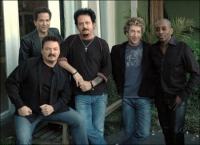
Toto was a Grammy Award winning American rock band founded in 1977 by some of the most popular and experienced session musicians of the era. The band enjoyed great commercial success in the 1980s, beginning with the band's self-titled debut, released in 1978, which immediately brought the band into the mainstream rock spectrum of the time. Continuing with 1982's critically acclaimed and commercially successful Toto IV, Toto became one of the biggest selling music groups of their era. They also composed the theme music for the film Dune. Although their popularity in the United States diminished in the 1990s and 2000s, they continued to tour to sold out arenas, clubs, and theaters internationally. Toto was known for their technical prowess in the studio, as well as a musical style that combines elements of pop, rock, soul, funk, progressive rock, hard rock, R&B, and jazz, making them appeal to a variety of musicians and non-musician listeners. The band has released 17 albums and has sold over 30 million records to date. Their 18th release Falling In Between Live, was released in August 2007. It had been recorded in March 2007 in Paris. As a result of guitarist Steve Lukather's departure from the band, Toto broke up after the last leg of their 2008 tour.
Gloria Gaither

Gloria Gaither is a Christian singer-songwriter, author, speaker, editor, and academic. She is married to Bill Gaither and together they have written more than 700 songs. She performed, traveled and recorded with the Bill Gaither Trio from 1965 through 1991.
Chevelle

Chevelle is an American rock band formed in Grayslake, Illinois, in 1995. The band was originally composed of two brothers, Pete Loeffler and Sam Loeffler, along with Matt Scott. Scott was replaced by Sam and Pete's brother, Joe Loeffler, in 1996.
Felice Anerio
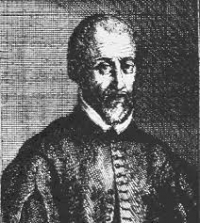
Felice Anerio was an Italian composer of the late Renaissance and early Baroque eras, and a member of the Roman School of composers. He was the older brother of another important, and somewhat more progressive composer of the same period, Giovanni Francesco Anerio.
Avril Lavigne

Avril Lavigne Whibley (born September 27, 1984), better known by her birth name of Avril Lavigne, is a Canadian Grammy award-nominated rock singer, musician, fashion designer and actress. In 2006, Canadian Business Magazine ranked her the seventh most powerful Canadian in Hollywood.
Lavigne's debut album, Let Go, was released in 2002. Over 16 million copies were sold worldwide and it was certified six times platinum in the United States. Her second and third albums, Under My Skin (2004) sold over 8 million copies and The Best Damn Thing (2007) currently over 6 million copies sold respectively, reached number one on the U.S. Billboard 200. Lavigne has scored six number one songs worldwide to date and a total of eleven top ten hits, including "Complicated", "Sk8er Boi", "I'm With You", "My Happy Ending", and "Girlfriend" which became #1 hits in the ARC Top 40. In December 2007, Lavigne was ranked at #7 in the Forbes "Top 20 Earners Under 25", with an annual earnings of $12 million. Currently, Avril Lavigne has sold about 30 million albums worldwide.
Lavigne's debut album, Let Go, was released in 2002. Over 16 million copies were sold worldwide and it was certified six times platinum in the United States. Her second and third albums, Under My Skin (2004) sold over 8 million copies and The Best Damn Thing (2007) currently over 6 million copies sold respectively, reached number one on the U.S. Billboard 200. Lavigne has scored six number one songs worldwide to date and a total of eleven top ten hits, including "Complicated", "Sk8er Boi", "I'm With You", "My Happy Ending", and "Girlfriend" which became #1 hits in the ARC Top 40. In December 2007, Lavigne was ranked at #7 in the Forbes "Top 20 Earners Under 25", with an annual earnings of $12 million. Currently, Avril Lavigne has sold about 30 million albums worldwide.
Koji Kondo

Koji Kondo (近藤浩治 Kondō Kōji?, born August 13, 1960) is a Japanese video game composer and sound director who has been employed at Nintendo since 1984. He is best known for scoring numerous titles in the Mario and The Legend of Zelda series.
Gavin DeGraw

Gavin DeGraw (born February 4, 1977) is an American singer-songwriter and musician.
Originally, DeGraw started in Manhattan clubs alongside local pianists Andrew West and Lenny Revell, drawing several of his home town fans. He made his big break when "I Don't Want to Be" was chosen as the theme song for the teen drama One Tree Hill. The song has also been performed on American Idol, Australian Idol and Idol (Norway and Sweden) by various contestants during different seasons. Two of DeGraw's other songs, "Follow Through" and "Chariot," have also achieved popularity and radio play. His song "We Belong Together" was also featured in the 2006 film Tristan and Isolde. In 2004, DeGraw released an acoustic version of his album Chariot called Chariot Stripped. DeGraw and his band recorded the album live in the studio, in only one take on the vocals, seeking an intimate effect.
Originally, DeGraw started in Manhattan clubs alongside local pianists Andrew West and Lenny Revell, drawing several of his home town fans. He made his big break when "I Don't Want to Be" was chosen as the theme song for the teen drama One Tree Hill. The song has also been performed on American Idol, Australian Idol and Idol (Norway and Sweden) by various contestants during different seasons. Two of DeGraw's other songs, "Follow Through" and "Chariot," have also achieved popularity and radio play. His song "We Belong Together" was also featured in the 2006 film Tristan and Isolde. In 2004, DeGraw released an acoustic version of his album Chariot called Chariot Stripped. DeGraw and his band recorded the album live in the studio, in only one take on the vocals, seeking an intimate effect.
Jaya Suprana
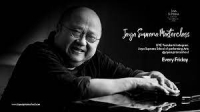
Jaya Suprana, (née Phoa Kok Tjiang) is an Indonesian pianist, composer, conductor, writer, cartoonist, and television presenter.Jaya Suprana was born in Denpasar, Bali as a Chinese descendant, but grew up within Javanese culture. He studied music at Musikhochschule Münster and Folkwang-Hochschule Essen, West Germany, between 1967 and 1976, and since then has given piano recitals worldwide, as well as composing his own music. He also presents his own national weekly talkshow called the Jaya Suprana Show. His daily writings have appeared in the daily newspapers Kompas, Suara Pembaruan, Sinar Harapan, on-line media such as RMOL, Askara, SMSI and books published by Elex Media Komputindo.
Real Book

The Real Book refers to compilations of lead sheets for jazz standards. It usually refers to the first volume of a series of books transcribed and collated by Berklee College of Music students during the 1970s.The name is derived from "fake books", so called because they contained only rough outlines of music pieces rather than fully notated scores. Early fake books were often used by professional bands who performed mostly standards, often more geared to society and dance bands rather than jazz ensembles, and devoted much space to show tunes, novelty tunes, traditional jazz, etc. The first three Real Book volumes, in contrast, contained many bebop and other jazz standards that were likely to be encountered on jazz gigs at the time. For this reason, the books were quickly adopted among jazz players in the 1970s, particularly on the east coast.
Marie Cowan

Marie Cowan is not an Australian Music Centre represented artist, however the following works can be found in our collection:
The Beatles

The Beatles were a pop and rock group from Liverpool, England formed in 1960. Primarily consisting of John Lennon (rhythm guitar, vocals), Paul McCartney (bass guitar, vocals), George Harrison (lead guitar, vocals) and Ringo Starr (drums, vocals) throughout their career, The Beatles are recognised for leading the mid-1960s musical "British Invasion" into the United States. Although their initial musical style was rooted in 1950s rock and roll and homegrown skiffle, the group explored genres ranging from Tin Pan Alley to psychedelic rock. Their clothes, styles, and statements made them trend-setters, while their growing social awareness saw their influence extend into the social and cultural revolutions of the 1960s. After the band broke up in 1970, all four members embarked upon solo careers.
The Beatles are one of the most commercially successful and critically acclaimed bands in the history of popular music, selling over a billion records internationally. In the United Kingdom, The Beatles released more than 40 different singles, albums, and EPs that reached number one, earning more number one albums (15) than any other group in UK chart history. This commercial success was repeated in many other countries; their record company, EMI, estimated that by 1985 they had sold over one billion records worldwide. According to the Recording Industry Association of America, The Beatles have sold more albums in the United States than any other band. In 2004, Rolling Stone magazine ranked The Beatles number one on its list of 100 Greatest Artists of All Time. According to that same magazine, The Beatles' innovative music and cultural impact helped define the 1960s, and their influence on pop culture is still evident today. In 2008, Billboard magazine released a list of top-selling Hot 100 artists to celebrate the chart's fiftieth anniversary; The Beatles reached #1 again.
The Beatles are one of the most commercially successful and critically acclaimed bands in the history of popular music, selling over a billion records internationally. In the United Kingdom, The Beatles released more than 40 different singles, albums, and EPs that reached number one, earning more number one albums (15) than any other group in UK chart history. This commercial success was repeated in many other countries; their record company, EMI, estimated that by 1985 they had sold over one billion records worldwide. According to the Recording Industry Association of America, The Beatles have sold more albums in the United States than any other band. In 2004, Rolling Stone magazine ranked The Beatles number one on its list of 100 Greatest Artists of All Time. According to that same magazine, The Beatles' innovative music and cultural impact helped define the 1960s, and their influence on pop culture is still evident today. In 2008, Billboard magazine released a list of top-selling Hot 100 artists to celebrate the chart's fiftieth anniversary; The Beatles reached #1 again.
OneRepublic

OneRepublic is an American Rock band formed in Colorado. After a few years of moderate success, they have since drawn mainstream attention with the release of their single "Apologize," which has sold in excess of 7 million singles worldwide. The song, according to SoundScan Data, is one of only two songs that have reached 3 million legal downloads in history. A remix of "Apologize" was featured on Timbaland's Shock Value and the band's debut album, Dreaming Out Loud, produced by Greg Wells. Their debut album was released in the United States on November 20, 2007, with international release dates staggered throughout early 2008. As of June 14, 2008, Dreaming Out Loud had sold 761,298 copies in the U.S. with the bands total album sales coming to over 1.5 million worldwide so far. The band's second single, "Stop and Stare," has also crossed the 2 million mark in terms of worldwide single sales. Their third single, "Say (All I Need)", has been released in the UK and in the U.S. Their fourth single will be "Mercy", as stated by OneRepublic's MySpace page. The video has been streamed on Youtube.com.
Current members:
Ryan Tedder – Lead vocals, Guitar, Bass Guitar, Piano, Glockenspiel, Drums (2002–present)
Zach Filkins – Guitar, vocals (2002–present)
Drew Brown – Guitar, Bass Guitar, Glockenspiel (2002–present)
Eddie Fisher – Drums, percussion (2005–present)
Brent Kutzle – Bass guitar, keyboards, cello, vocals (2007–present)
Current members:
Ryan Tedder – Lead vocals, Guitar, Bass Guitar, Piano, Glockenspiel, Drums (2002–present)
Zach Filkins – Guitar, vocals (2002–present)
Drew Brown – Guitar, Bass Guitar, Glockenspiel (2002–present)
Eddie Fisher – Drums, percussion (2005–present)
Brent Kutzle – Bass guitar, keyboards, cello, vocals (2007–present)
yuhki kuramoto
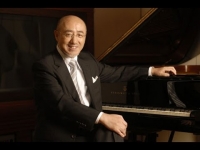
uhki Kuramoto is a Japanese pianist and composer. His given name is Minoru Kitano (北野 實, Kitano Minoru). He writes primarily for the piano, though ...
Heinz Roemheld

Heinz Roemheld (May 1, 1901 – February 11, 1985) was an American composer.Born Heinz Eric Roemheld in Milwaukee, Wisconsin, he was one of four children of German immigrant Heinrich Roemheld and his wife Fanny Rauterberg Roemheld. Heinrich was a pharmacist, but all the members of the family were musical. Heinz's brother Edgar (1898-1964) became a conductor, while sister Irmgard (1904-1995) became a well-known Milwaukee music teacher and radio broadcaster.
Sonny Rollins
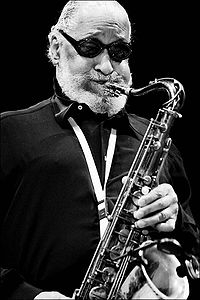
Theodore Walter Sonny" Rollins, American jazz tenor saxophonist. It is considered one of the living jazz legends. Many of his compositions, "St. Thomas", "Oleo", "Doxy", and "Airegin", are among the jazz standards.
Liszt

Franz Liszt (October 22, 1811 – July 31, 1886) was a Hungarian composer, virtuoso pianist and teacher.
Liszt became renowned throughout Europe for his great skill as a performer; to this day, many consider him to have been the greatest pianist in history. He was also an important and influential composer, a notable piano teacher, a conductor who contributed significantly to the modern development of the art, and a benefactor to other composers and performers, notably Richard Wagner and Hector Berlioz.
As a composer, Liszt was one of the most prominent representatives of the "Neudeutsche Schule" ("New German School"). He left behind a huge and diverse oeuvre, in which he influenced his forward-looking contemporaries and anticipated some 20th-century ideas and trends. Some of his most notable contributions were the invention of the symphonic poem, developing the concept of thematic transformation as part of his experiments in musical form and making radical departures in harmony.
Liszt has most frequently been credited to have been the first pianist who gave concerts with programs consisting only of solo pieces. An example is a concert he gave on March 9, 1839, at the Palazzo Poli in Rome. Since Liszt could not find singers who — following the usual habit of the time — should have completed the program, he played four numbers all alone.
Liszt was a prolific composer. Most of his music is for the piano and much of it requires formidable technique.In his most famous and virtuosic works, he is the archetypal Romantic composer. Liszt pioneered the technique of thematic transformation, a method of development which was related to both the existing variation technique and to the new use of the Leitmotif by Richard Wagner. Liszt's piano works are usually divided into two classes. On the one hand, there are "original works", and on the other hand "transcriptions", "paraphrases" or "fantasies" on works by other composers.
Liszt became renowned throughout Europe for his great skill as a performer; to this day, many consider him to have been the greatest pianist in history. He was also an important and influential composer, a notable piano teacher, a conductor who contributed significantly to the modern development of the art, and a benefactor to other composers and performers, notably Richard Wagner and Hector Berlioz.
As a composer, Liszt was one of the most prominent representatives of the "Neudeutsche Schule" ("New German School"). He left behind a huge and diverse oeuvre, in which he influenced his forward-looking contemporaries and anticipated some 20th-century ideas and trends. Some of his most notable contributions were the invention of the symphonic poem, developing the concept of thematic transformation as part of his experiments in musical form and making radical departures in harmony.
Liszt has most frequently been credited to have been the first pianist who gave concerts with programs consisting only of solo pieces. An example is a concert he gave on March 9, 1839, at the Palazzo Poli in Rome. Since Liszt could not find singers who — following the usual habit of the time — should have completed the program, he played four numbers all alone.
Liszt was a prolific composer. Most of his music is for the piano and much of it requires formidable technique.In his most famous and virtuosic works, he is the archetypal Romantic composer. Liszt pioneered the technique of thematic transformation, a method of development which was related to both the existing variation technique and to the new use of the Leitmotif by Richard Wagner. Liszt's piano works are usually divided into two classes. On the one hand, there are "original works", and on the other hand "transcriptions", "paraphrases" or "fantasies" on works by other composers.
She Loves Me
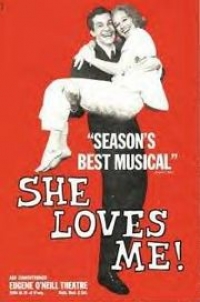
She Loves Me is a musical with a book by Joe Masteroff, lyrics by Sheldon Harnick, and music by Jerry Bock.The musical is the third adaptation of the 1937 play Parfumerie by Hungarian playwright Miklós László, following the 1940 James Stewart-Margaret Sullavan film The Shop Around the Corner and the 1949 Judy Garland-Van Johnson musical version In the Good Old Summertime. It surfaced again in 1998 as the Tom Hanks-Meg Ryan feature You've Got Mail. The plot revolves around Budapest shop employees Georg Nowack and Amalia Balash who, despite being consistently at odds with each other at work, are unaware that each is the other's secret pen pal met through lonely-hearts ads.
Hangad Music Ministry

Hangád (Tagalog: "yearning" or "desire") is an inspirational vocal ensemble known for songs like Pananatili, Pagkakaibigan, and Panunumpâ (covered by pop singer Carol Banawa). They have also recorded albums which are co-produced with the Jesuit Music Ministry (JMM), the musical arm of Jesuit Communications Foundation (JesCom) of the Philippine Province of the Society of Jesus.
In 2006, Hangad won an Awit Award for Best Inspirational or Religious Song.[1
In 2006, Hangad won an Awit Award for Best Inspirational or Religious Song.[1
Hiromi Uehara

Hiromi Uehara (上原ひろみ, born 26 March 1979), known as Hiromi, is a jazz composer and pianist born in Hamamatsu, Japan. She is known for her virtuosic technique, energetic live performances and blend of musical genres such as post-bop, progressive rock, classical and fusion in her compositions.
Johann Strauss

Johann Strauss I (March 14, 1804 – September 25, 1849; German: Johann Baptist Strauß, Johann Strauss (Vater); also Johann Baptist Strauss, Johann Strauss, Sr., the Elder, the Father), born in Vienna, was an Austrian Romantic composer famous for his waltzes, and for popularizing them alongside Joseph Lanner, thereby setting the foundations for his sons to carry on his musical dynasty. His most famous piece is probably the Radetzky March (named after Joseph Radetzky von Radetz), while his most famous waltz is probably the Lorelei Rheinklänge, Op. 154.
Reynaldo Hahn
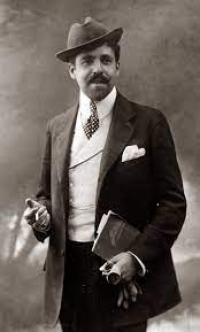
Reynaldo Hahn (Spanish pronunciation: ; 9 August 1874 – 28 January 1947) was a Venezuelan-born French composer, conductor, music critic, and singer. He is best known for his songs – mélodies – of which he wrote more than 100.
Hahn was born in Caracas but his family moved to Paris when he was a child, and he lived most of his life there. Following the success of his song "Si mes vers avaient des ailes" (If my verses had wings), written when he was aged 14, he became a prominent member of fin de siècle French society.
Hahn was born in Caracas but his family moved to Paris when he was a child, and he lived most of his life there. Following the success of his song "Si mes vers avaient des ailes" (If my verses had wings), written when he was aged 14, he became a prominent member of fin de siècle French society.
Aqua timez

Aqua timezFutoshi and OKP-Star met on with9.com in 2000 and attempted to start a band together. Unable to agree on the band's future, the two disbanded. In 2003, the current band members gathered and formed Aqua Timez. Their first independent music mini album, Sora Ippai ni Kanaderu Inori, was released in August 2005.[3
Linda Lapp

Linda Lapp Canadian folk musician based in Victoria, British Columbia
George Baker
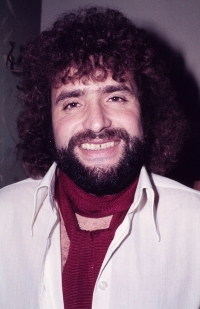
George Baker is a Dutch singer and songwriter who, with his band George Baker Selection, scored two international hits in the 1970s, "Paloma Blanca" and "Little Green Bag." He became a solo artist after 1989. "Little Green Bag" was used as the opening soundtrack for the film Reservoir Dogs.
Katy Perry

Katy Perry (born Katheryn Elizabeth Hudson; October 25, 1984) is an American singer-songwriter. She has risen to prominence with her 2008 single "I Kissed a Girl" which has become a worldwide hit topping the charts in more than 20 countries, including United Kingdom, Canada, Australia, Ireland, and the United States, where it was the 1000th Billboard Hot 100 number 1. Perry has stated in the press that it's thanks to successful British singer-songwriters Amy Winehouse and Lily Allen that more female artists had been appearing on the charts. She went on to say that Winehouse and Allen "have introduced America to great music". She is known for her unconventional style of dress, often humoristic, bright in color and reminiscent of different decades, as well as her frequent use of fruit-shaped accessories, mainly watermelon as part of her outfits. Perry has a contralto vocal range.
Jeanine Tesori
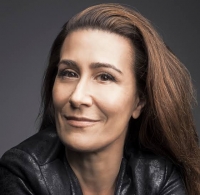
Jeanine Tesori is an American composer and musical arranger. She is the most prolific and honored female theatrical composer in history, with five Broadway musicals and five Tony Award nominations.
George Gershwin

George Gershwin (September 26, 1898 – July 11, 1937) was an American composer. He wrote most of his vocal and theatrical works in collaboration with his elder brother, lyricist Ira Gershwin. George Gershwin composed songs both for Broadway and for the classical concert hall. He also wrote popular songs with success.
Many of his compositions have been used on television and in numerous films, and many became jazz standards. The jazz singer Ella Fitzgerald recorded many of the Gershwins' songs on her 1959 Gershwin Songbook (arranged by Nelson Riddle). Countless singers and musicians have recorded Gershwin songs, including Fred Astaire, Louis Armstrong, Al Jolson, Bobby Darin, Art Tatum, Bing Crosby, Janis Joplin, John Coltrane, Frank Sinatra, Billie Holiday, Sam Cooke, Miles Davis, Herbie Hancock, Madonna, Judy Garland, Julie Andrews, Barbra Streisand, Marni Nixon, Natalie Cole, Patti Austin, Nina Simone, Maureen McGovern, John Fahey, The Residents, Than & Sam, Sublime, and Sting. A residential building is named after him on the Stony Brook University campus.
Many of his compositions have been used on television and in numerous films, and many became jazz standards. The jazz singer Ella Fitzgerald recorded many of the Gershwins' songs on her 1959 Gershwin Songbook (arranged by Nelson Riddle). Countless singers and musicians have recorded Gershwin songs, including Fred Astaire, Louis Armstrong, Al Jolson, Bobby Darin, Art Tatum, Bing Crosby, Janis Joplin, John Coltrane, Frank Sinatra, Billie Holiday, Sam Cooke, Miles Davis, Herbie Hancock, Madonna, Judy Garland, Julie Andrews, Barbra Streisand, Marni Nixon, Natalie Cole, Patti Austin, Nina Simone, Maureen McGovern, John Fahey, The Residents, Than & Sam, Sublime, and Sting. A residential building is named after him on the Stony Brook University campus.
Mika

Mica Penniman (born 18 August 1983), known as Mika, is a Lebanese-born, London-based, Grammy-nominated and BRIT Award-winning singer-songwriter, who has a recording contract with Casablanca Records and Universal Music. He rose to fame around the end of 2006 and the start of 2007. His birth name is Michael Holbrook Penniman.
Laurens van rooyen
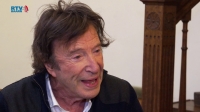
Laurens van Rooyen (Utrecht, 27 March 1935) is a Dutch pianist and composer. He is known for his cooperation in the theater with Herman van Veen. He composed many pieces for the piano and wrote the score for several Dutch films. He wrote two books on his experiences as a musician.
 Sheet Music Max is a site for those who wants to access popular sheet music easily,
letting them download the sheet music for free for trial purposes.
It's completely free to download and try the listed sheet music, but you have to delete the files after 24 hours of trial.
Don't forget, if you like the piece of music you have just learned playing,
treat the artist with respect, and go buy the original sheet music.
Sheet Music Max is a site for those who wants to access popular sheet music easily,
letting them download the sheet music for free for trial purposes.
It's completely free to download and try the listed sheet music, but you have to delete the files after 24 hours of trial.
Don't forget, if you like the piece of music you have just learned playing,
treat the artist with respect, and go buy the original sheet music.
